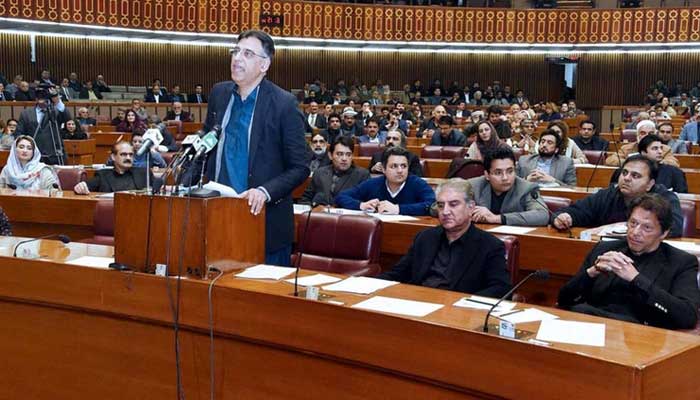PTI presents corrective package
Asad Umar said Pakistan is confronted with serious economic challenges requiring strong corrective actions. He said these challenges are an outcome of weaknesses in the economy, making the country vulnerable to external and internal shocks, and causing economic instability.
ISLAMABAD: Finance Minister Asad Umar on Wednesday unveiled the Finance Supplementary Second Amendment Bill 2019 with incentives for industries, agriculture and investment sectors, while luxury items, vehicles and cigarettes became dearer.
In his speech before the parliament, Asad Umar made commitment to present macroeconomic framework next week and said that in case of need arising of going back to the IMF, it would be made the last programme from the Fund.
However, independent economists argued that the PTI-led government again failed to come up with prescription of curtailing the twin deficits, including the budget deficit and current account deficit, that possess risks for eruption of balance of payment crisis within a few months despite getting generous packages from the friendly countries including Saudi Arabia, UAE and possibly from China.
Asad Umar said Pakistan is confronted with serious economic challenges requiring strong corrective actions. He said these challenges are an outcome of weaknesses in the economy, making the country vulnerable to external and internal shocks, and causing economic instability. He said the fiscal deficit stood at 6.6 percent of the GDP and financial losses of state-owned enterprises were at a record high level of 1.4 percent of GDP.
He said the PTI government wanted to protect the vulnerable segment of the society as the high cost of full adjustment in the first two years would fall disproportionately on the poor, and the public safety nets will not be able to mitigate the full cost. The minister said the current economic instability is the outcome not only of weak decisions taken in the recent past, but also the deeper structural issues plaguing the economy. These structural problems are the reason why the gains from the past stabilisation programs have continued to be unsustainable.
He said the present government took the necessary adjustment measures and initiated a path of structural reforms. This not only provides solid foundations for economic recovery, and also avoids recurrence of economic instability every few years, but the efficiency gains from structural reforms will lessen the need for strong and rapid stabilisation actions, thus mitigating some of the pains of these measures, particularly for vulnerable segments of the population.
Moreover, he said electricity and gas prices were rationalised to improve the financial health of energy utilities, reduce their burden on the budget and part-finance the huge overhang of energy sector’s “circular debt”. He said that they would continue to take additional measures to ensure continued macroeconomic stability. All our efforts will ensure that by the end of FY 2019 there will be a further improvement in the trade balance.
The minister said the other fundamental weakness in the economy is the large and growing gap between exports and imports. This gap, despite large inflow of workers’ remittances, has been the primary source of balance of payment fragilities and macroeconomic instability.
While criticising the last government of PML-N, he said that previous policies have focused on accelerating growth through large scale borrowing to finance investment. “Yet as a percentage of GDP, investment in Pakistan is among the lowest in the region -- almost half the level in India and Bangladesh,” he said.
The most important factor behind inadequate level of investment is the low level of savings, with a national saving rate of only 10.8 percent of GDP, he said and added that this implies that higher investment can only be financed through higher foreign borrowings, which increases the foreign debt burden and creates balance of payments challenges. Other than low level of savings, he said, investment is also constrained by a non-favourable investment and business climate created by multi-tiered regulations and taxation, and weaknesses in Pakistan’s financial sector.
The minister said the government is moving aggressively to improve exports, investment and savings. “The package that PTI government is announcing today is a step in that direction,” he observed.
The government, he said, believes that the course of stabilisation coupled with structural reforms will usher an era of economic prosperity for the people of Pakistan. “In the coming years, our focus would be to accelerate investment and domestic savings. Growth will come through expanding domestic supply and financed largely from domestic resources,” he said.
Through the above policy direction, he said, the government will create quality jobs for the unemployed youth of the country by equipping them with requisite knowledge and skills, protect households from rising cost of living and above all raise the productive capacity of the economy.
“Affordable and low cost housing is one of the major priority areas of PTI government. The government is aiming at building houses for the very poor in the first phase of the project. The government is establishing Rs5 billion revolving fund to provide Qarz-e-Hasana to needy families to own a house,” he added.
“Our framework for revival of the economy is cantered on sound governance. The principle instrument of sound governance is appointing right people for the right positions. We have ensured that in all our appointments in key institutions capable and professional people,” he said.
Asad Umar said the government intends to support the industry through this business revival package. “It is thus proposing a settlement of GIDC arrears and a reduction in overall rate of GIDC for all sectors in an effort to reduce cost of doing business in the country,” he said.
The minister said helping the Pakistani farmers through provision of credit is being ensured by enhancing the value of Produce Index Unit from Rs4,000 to Rs6,000. “This will mean 50 percent increase in the value of collateral available to the farmers for obtaining agricultural loans from the banking sector,” he said.
Asad Umar said the government has ensured adequate supplies of urea in Rabbi Season by providing a subsidy of Rs1,143/bag for 100,000 tons of imported urea. “Local manufacturers have also been subsidised to Rs714 per bag of urea by providing cheaper feed gas. The government has recently operationalised two fertiliser plants, located at SNGPL network, by providing Rs1,137 per bag of urea as subsidy for using LNG. This intervention will aid in keeping a competitive price of Urea in domestic market at Rs1,805 per bag,” he said.
In addition, he said, the government is considering reducing the Gas Infrastructure Development Cess (GIDC) on urea fertiliser by 50 percent for all such industries which agree to pay the arrears of GIDC. This will not only clear the struck up revenue of the government as GIDC is not been deposited in the exchequer, provide additional revenues to the government but will reduce the price of urea by a minimum of Rs200 per bag as well as the prices of associated fertilisers i.e. DAP, NP (Nitrophos) and CAN (Calcium Ammonium Nitrate) will also decrease accordingly.
For small marriage halls, community halls with function area less 500 square yard, the minimum advance tax has been reduced from Rs20,000 to Rs5,000. To incentivise foreign remittance by overseas Pakistanis, advance tax on cash withdrawal on accounts solely fed by foreign remittance has been exempted.
Asad Umar said stock exchange is an important barometer of economic activity and its strength gives a signal of strong Pakistani economy to the international markets. “In order to promote investment through the stock exchange, several measures are being taken. Currently, members of a stock exchange registered in Pakistan are subject to collection of advance income tax on purchase and sale at the rate of 0.02% of value of shares. On demand of Pakistan Stock Exchange and business community, and in order to facilitate and increase investment and business confidence, this advance income tax is proposed to be abolished,” he said.
He said presently sales tax exemption on plant and machinery is available only to specified sectors, while other sectors have to pay sales tax on import of plant and machinery. “In order to encourage greenfield investment and industrialisation, it is proposed to grant exemption from payment of sales tax on plant and machinery to be used for setting up new industry for production of taxable goods,” he said.
The minister also shared a proposal for abolition of super tax on non-banking companies. “Super tax was introduced through Finance Act 2015. It is chargeable on non-banking taxpayers with income of Rs500 million or higher and all banking companies. In order to lower the burden of tax on corporate sector and promote economic activity, it is proposed that the super tax for non-banking taxpayers may be abolished after tax year 2019. For banking companies, super tax was chargeable at the rate of 4 percent prior to Finance Act 2018. It is, however, proposed that same rate may continue for the banking companies,” he said.
-
 Royal Family Makes Statement On Prince Edward's Visit Where He Addressed Epstein Files
Royal Family Makes Statement On Prince Edward's Visit Where He Addressed Epstein Files -
 5 Most 'weirdest' Taxes In The World That May Surprise You
5 Most 'weirdest' Taxes In The World That May Surprise You -
 Amanda Seyfried Makes Bold Remark About 'Mamma Mia 3'
Amanda Seyfried Makes Bold Remark About 'Mamma Mia 3' -
 YouTube Experiments With New Desktop Layout
YouTube Experiments With New Desktop Layout -
 Bianca Censori’s Kanye West Relationship Nears The End: Insider Exposes Turmoil And Her Turn Towards Kim
Bianca Censori’s Kanye West Relationship Nears The End: Insider Exposes Turmoil And Her Turn Towards Kim -
 Woman, Five Others Accused Of Plot To Kill Judge 'to Free Jailed Lover'
Woman, Five Others Accused Of Plot To Kill Judge 'to Free Jailed Lover' -
 Deepfake Fraud Goes Industrial: How AI Scams Are Scaling Globally In 2026
Deepfake Fraud Goes Industrial: How AI Scams Are Scaling Globally In 2026 -
 Taylor Swift Reveals The Real Story Behind Her New Music Video
Taylor Swift Reveals The Real Story Behind Her New Music Video -
 Global Memory Chip Crunch Puts Spotlight On Apple; Will IPhone Become More Pricey?
Global Memory Chip Crunch Puts Spotlight On Apple; Will IPhone Become More Pricey? -
 Kaley Cuoco Slams Ashley Tisdale's Mom Group Claims
Kaley Cuoco Slams Ashley Tisdale's Mom Group Claims -
 EU Regulators Target TikTok Over Addictive Design
EU Regulators Target TikTok Over Addictive Design -
 China Launches World’s First Biomimetic AI Robot That Feels Human
China Launches World’s First Biomimetic AI Robot That Feels Human -
 Japan’s Cherry Blossom Festival Canceled In Fujiyoshida; Here’s What To Know
Japan’s Cherry Blossom Festival Canceled In Fujiyoshida; Here’s What To Know -
 King Charles Searches For Fresh Talent After Brother Andrew's Move
King Charles Searches For Fresh Talent After Brother Andrew's Move -
 'Very Serious' Timothee Chalamet, Kylie Jenner Plan Wedding, Kris Jenner Considers Him 'dream' Son-in-law
'Very Serious' Timothee Chalamet, Kylie Jenner Plan Wedding, Kris Jenner Considers Him 'dream' Son-in-law -
 Keith Urban 'regrets' His Divorce From Nicole Kidman?
Keith Urban 'regrets' His Divorce From Nicole Kidman?




